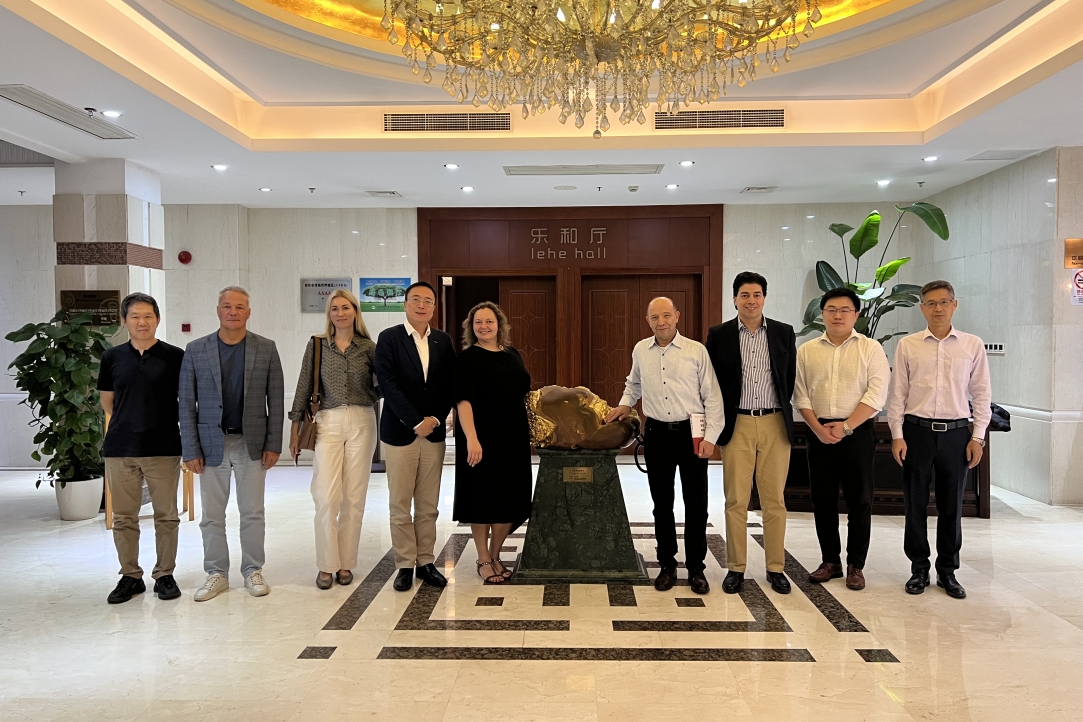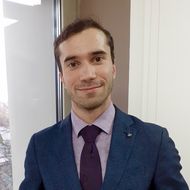- A
- A
- A
- ABC
- ABC
- ABC
- А
- А
- А
- А
- А
- HSE University
- Faculties
- Faculty of Economic Sciences
- School of Finance
- News
- Early-Career Researchers from HSE University and Shanghai University Exchange Best Practices
-
The School
-
RESEARCH ACTIVITIES
- Laboratories
- Series “Advanced studies in emerging market’s finance” at Springer Nature o Networking with international academic associations
- Networking with international academic associations
- Research seminars
- International PhD workshop
- The International Seminar «ESG Transformation»
-
RESEARCH WORKING GROUPS
- Research Working Group "Innovations in the banking sector, its financial stability and prudential regulation"
- BUSINESS EDUCATION
- Networking with business associations
- Networking with professional associations
- Center for Research on Non-Financial Reporting
-
DATABASES
119049 Moscow, Russia
11 Pokrovskiy boulevard, room S629
Phone:
+7 (495) 772-95-90*27447, *27947, *27190
+7 (495) 916-88-08 (Master’s Programme Corporate Finance)
- Email: df@hse.ru
Head of Corporate Finance Research Center, Dr., tenured professor

+7495-772-95-90 (add. 27447)

+7495-772-95-90 (add. 27947)
The HSE School of Finance is the leading Russian competence center in the field of corporate finance, business valuation, banking, stock market, risk management and insurance, accounting and audit.
HSE is the first Russian university in the global ranking "QS - World University Rankings by subject", 2022 in the subject area of Accounting and Finance. Moreover, the university is the 1-st in the rating "THE World University Rankings by subject" in the subject area of Business & Management Studies, 2022
Cherkasova V. A., Nenuzhenko I.
Journal of Economic Integration. 2022. Vol. 37. No. 1. P. 54-92.
Electronic Journal of Applied Statistical Analysis. 2022. Vol. 15. No. 1. P. 187-210.
Kolade S. A., Semenova M.
Financial Economics. FE. Высшая школа экономики, 2022. No. WP BRP 87/FE/2022.
Управление финансовыми рисками. 2022. Т. 70. № 2. С. 108-120.
In bk.: The 8th International Conference on Information Technology and Quantitative Management (ITQM 2020 & 2021): Developing Global Digital Economy after COVID-19. Vol. 199: The 8th International Conference on Information Technology and Quantitative Management (ITQM 2020 & 2021): Developing Global Digital Economy after COVID-19. Manchester: Elsevier, 2022. P. 798-805.
Korablev D., Poduhovich D.
Journal of Corporate Finance Research. 2022. Vol. 16. No. 1. P. 136-145.
Olkhovik V., Lyutova O. I., Juchnevicius E.
Научно-исследовательский финансовый институт. Финансовый журнал. 2022. Vol. 14. No. 2. P. 73-90.
Churyk N. T., Anna Vysotskaya, Kolk B. v.
Journal of Accounting Education. 2022. Vol. 58.
Абдрахманова Г. И., Васильковский С. А., Вишневский К. О. и др.
М.: Издательский дом ГУ-ВШЭ, 2022.
Абдрахманова Г. И., Васильковский С. А., Вишневский К. О. и др.
М.: Национальный исследовательский университет "Высшая школа экономики", 2022.
Гришунин С. В., Сулоева С. Б., Пищалкина И. И.
Организатор производства. 2022. Т. 30. № 1. С. 60-72.
Гришунин С. В., Сулоева С. Б., Пищалкина И. И.
Экономический анализ: теория и практика. 2022. Т. 21. № 3. С. 478-496.
S. Grishunin, E. Naumova, N. Lukshina et al.
Russian Management Journal. 2021. Vol. 19. No. 4. P. 475-493.
Journal of Corporate Finance Research. 2022. Vol. 16. No. 1. P. 99-112.
Grishunin S., Bukreeva Alesya, Alyona A.
In bk.: The 8th International Conference on Information Technology and Quantitative Management (ITQM 2020 & 2021): Developing Global Digital Economy after COVID-19. Vol. 199: The 8th International Conference on Information Technology and Quantitative Management (ITQM 2020 & 2021): Developing Global Digital Economy after COVID-19. Manchester: Elsevier, 2022. P. 190-197.
 International Conference “Future Directions in Accounting and Finance Education”, 27-28 May 2019, Moscow, Russia
International Conference “Future Directions in Accounting and Finance Education”, 27-28 May 2019, Moscow, Russia
Edited by: А. Б. Высотская, B. v. Kolk.
Vol. 58. Elsevier, 2022.
Karamysheva M., Seregina E.
Journal of International Money and Finance. 2022. Vol. 127.
In press
Journal of Economic Dynamics and Control. 2022. Vol. 137.
Karamysheva M., Skrobotov A.
Journal of Economic Dynamics and Control. 2022. Vol. 138.
Известия Санкт-Петербургского государственного экономического университета. 2022. № 4. С. 144-155.
Тихомиров Д. В., Цехомский Н. В.
Экономика и управление. 2022. Т. 28. № 1. С. 16-24.
Селезнёва З. В., Евдокимова М. С.
Финансы: теория и практика. 2022. Т. 26. № 3. С. 64-84.
Evdokimova M., Stepanova A. N.
In bk.: 38th EBES Conference - Program and Abstract Book. Istanbul: EBES, 2022. P. 39.
Assanskiy A., Shaposhnikov D., Tylkin I. et al.
Journal of Behavioral and Experimental Economics. 2022. Vol. 98.
Teplova T., Mikova E., Munir Q. et al.
Economic Change and Restructuring. 2023. Vol. 56. No. 1. P. 515-535.
Повх К. С., Кокорева М. С., Степанова А. Н.
Экономический журнал Высшей школы экономики. 2022. Т. 26. № 1. С. 9-36.
Anton Markov, Zinaida Seleznyova, Victor Lapshin.
Journal of Finance and Data Science. 2022. Vol. 8. P. 180-201.

Early-Career Researchers from HSE University and Shanghai University Exchange Best Practices

On December 15, the Second Sino-Russian Economic Cooperation Workshop–Youth Forum took place online. The event was organised jointly by HSE University and the Shanghai University School of Economics. Anastasia Stepanova, Deputy Vice Rector of HSE University, Associate Professor at the School of Finance, and one of the workshop organisers, talked to the HSE News Service about cooperation with Shanghai University and the topics covered by the workshop.
Anastasia Stepanova
— How did the idea of a joint Sino-Russian workshop originate? Who participated?
— During the pandemic, our Faculty of Economic Sciences (FES) interacted with Shanghai University on a scientific basis. And in September of this year, a small FES delegation made up of my colleagues and I visited them for a small conference dedicated to changes in the global economy in recent years. Prof. Simachev spoke about the transformation of the global production system, Liudmila Zasimova talked about the impact of crises on bad habits and a healthy lifestyle. I presented the latest results of my and my co-author Maria Kokoreva’s work on decision-making models in global corporations. Colleagues from the host university also took part in the conference: they talked about structural changes in labour markets, migration, and changes in education costs. Participants from European universities spoke about digital transformation, structural industry changes, and the impact of the pandemic on market risks.
This conference and subsequent negotiations with the Shanghai University School of Economics were very productive. My colleagues and I agreed on further active interaction in the scientific field, as well as our readiness to exchange both undergraduate and graduate students and faculty in the sphere of economics and finance.
In early December, we invited colleagues from the Shanghai University School of Economics to speak at the School of Finance's international seminar on ESG, which was held on December 8–9 in a hybrid format. In parallel with this, we agreed to hold a youth event with equal participation of graduate students and young colleagues from the schools of HSE University and Shanghai University.
— What goals and objectives did you set for this event?
— The main goal of the workshop was to listen to our colleagues preparing to defend their PhD theses and to give them constructive comments from the two schools. A more far-reaching goal was to begin active interaction between young researchers from Shanghai University and HSE University. It was important for us that young colleagues help each other with their comments while also doing benchmarking and sharing best practices.
— What was the topic of the presentations?
— The topics of our young colleagues' presentations were focused on finance and international trade. Milan Dzogan, PhD candidate at SHU, talked about post-pandemic tourism. Zheng Haoran, PhD candidate at SHU, talked about transition transfer mechanisms in payment networks. Ion Frecautan, PhD candidate at HSE, talked about green bonds in emerging capital markets.
— Your doctoral student spoke at the workshop. What was her report about? How did you choose the topic?
— Polina Khmeleva, PhD candidate at the HSE School of Finance, is doing very interesting and relevant research on the cultural determinants of a firm's investment decisions. She studies how exactly the cultural characteristics brought by top managers and cultural heritage influence investment in corporations. Her work focuses on high-tech companies, where investment in R&D plays a paramount role, and these in turn are the drivers of economic growth. She takes into account the most important non-financial factors, which are difficult to take into account because they are hard to quantify. Polina uses both classical techniques, such as the Hofstede index, and completely new, recently proposed approaches for quantifying cultural characteristics. She received constructive comments and I hope that they will allow her to take another step and advance to the pre-defence of her dissertation.
— What would you say was the most interesting thing about the presentations?
— We discussed issues that are important both to us and to our colleagues from China: the consequences of the pandemic, cross-cultural effects in the economy, and green finance. Obviously, this piqued all our colleagues' interest: graduate students received quite a lot of comments from both Russian and Chinese colleagues. I would also like to note that the quality of the reports is pleasantly surprising: it is at the level of a very serious international conference with a demonstration of excellent methods and thoughtful research questions.
Interestingly, four reports were given by representatives of four countries.
— What are your future plans? Will there be a third workshop?
— There certainly will be. We invited colleagues to participate in the Yasin conference in April and are planning to hold the next joint event as part of it, this time hosted by HSE University.
- About
- About
- Key Figures & Facts
- Faculties & Departments
- International Partnerships
- Faculty & Staff
- HSE Buildings
- Public Enquiries
- Studies
- Admissions
- Programme Catalogue
- Undergraduate
- Graduate
- Exchange Programmes
- Summer University
- Summer Schools
- Semester in Moscow
- Business Internship
-
https://elearning.hse.ru/en/mooc/
Massive Open Online Courses
-
https://www.hse.ru/en/visual/
HSE Site for the Visually Impaired
-
http://5top100.com/
Russian Academic Excellence Project 5-100
- © HSE University 1993–2024 Contacts Copyright Privacy Policy Site Map
- Edit


